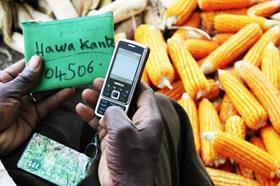
Bayer is looking to help smallholder farms in Africa save money for fertiliser and seeds without a bank account or access to a loan, by backing pilot projects in Mali and Senegal initiated by start-up company myAgro.
Mobile phones are widely used in rural areas of Africa and easy to use, and the myAgro model works in a similar way to pre-paid cards for cellphones. As soon as a farmer has a little money left over, they can buy a myAgro scratch card that has an associated code at the back of the card, which is sent to their myAgro account through SMS.
The farmers - up to 70 per cent of them women - can pay in even the smallest amounts, such as one US dollar.
To help boost this system, Bayer is donating some US$600,000 to the innovation, which will allow myAgro to deliver high-quality seed and fertiliser to an even greater number of farmers.
'Through our model, we are changing access to the financial system in a way that suits smallholder farmers,' said Anushka Ratnayake, founder and CEO of the start-up. 'That’s because their needs often are not compatible with conventional capital flows. In this way we help them to achieve increased prosperity.'
Thanks to myAgro’s savings program, high-quality products and on-time delivery, small farms that are usually cultivated by the families themselves increase their yields by 50 to 100 per cent on average and raise their net farming income by about US$150 to US$300 per year.
Bayer is looking to support innovative ideas and business models that help to improve living conditions in developing countries through the Aspirin Social Award, the alliance with the Global Impact Accelerator of the start-up fair Slush, as well as through targeted partnerships.
'Social innovation is part of our holistic approach to innovation,' explained Dr Monika Lessl, head of corporate innovation & R&D at Bayer AG and initiator of the collaboration. 'By collaborating with social entrepreneurs we strive to reshape global systems and catalyse future advancements in health and nutrition.'



